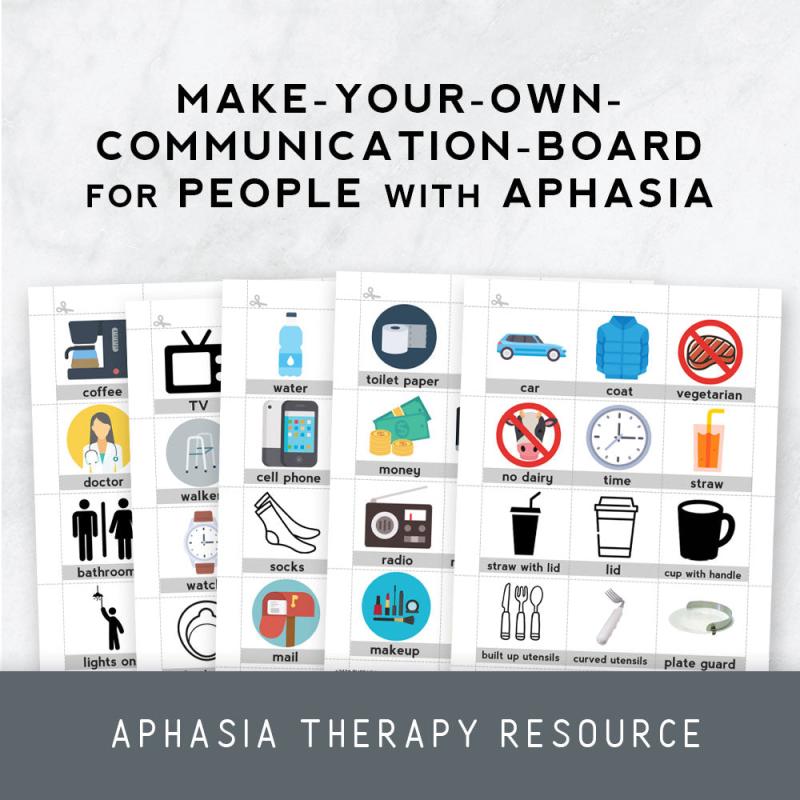How to communicate with people with aphasia?
Communicating with individuals with aphasia requires patience, understanding, and the use of effective strategies to facilitate comprehension and expression. Here are some tips for communicating with people with aphasia:
Speak Clearly and Slowly:
- Use a calm and unhurried pace when speaking. Avoid speaking too quickly or using complex sentences. Allow time for the person to process the information.
Use Short and Simple Sentences:
- Break down your communication into short, simple sentences. Focus on conveying essential information in a clear and concise manner.
Ask Yes/No Questions:
- Ask questions that can be answered with a simple "yes" or "no" to make it easier for the person with aphasia to respond.
Give One Instruction at a Time:
- Provide instructions or information one step at a time. Avoid overwhelming the person with multiple instructions or complex information.
Use Visual Aids:
- Supplement verbal communication with visual aids, gestures, or written cues. This can enhance understanding and help convey information more effectively.
Encourage Gestures and Pointing:
- Encourage the use of gestures, pointing, or other nonverbal communication to express needs or convey information.
Maintain Eye Contact:
- Maintain eye contact while speaking. Nonverbal cues and facial expressions can provide additional context and aid in understanding.
Repeat and Rephrase:
- If the person with aphasia has difficulty understanding, repeat or rephrase the information using different words. Be patient and persistent.
Give Time to Respond:
- Allow ample time for the individual to formulate a response. Avoid finishing their sentences or interrupting, as it can be frustrating.
Use a Communication Aid:
- Explore the use of communication aids, such as picture boards, speech-generating devices, or smartphone apps designed for individuals with aphasia.
Reduce Distractions:
- Minimize background noise and distractions in the environment to help the person focus on the conversation.
Encourage Writing:
- If writing is a preserved skill, encourage the person to write down thoughts or responses. This can be a helpful supplement to verbal communication.
Be Patient and Supportive:
- Patience and emotional support are crucial. Understand that communication may be challenging for the person with aphasia, and offer encouragement.
Include Them in Conversations:
- Include individuals with aphasia in group conversations. Ensure they feel valued and part of the social interaction.
Educate Others:
- Share information about aphasia and effective communication strategies with friends, family, and others who interact with the person regularly.
Remember that communication needs may vary among individuals with aphasia. It's essential to adapt your approach based on the specific needs and preferences of the person you are communicating with. Additionally, involving speech-language therapists can provide valuable guidance and support in developing personalized communication strategies.
Communicating with individuals with aphasia can be challenging, but with patience, understanding, and the right strategies, effective communication is possible. Here's a guide to understanding the challenges, effective communication techniques, and tips for enhancing communication and building rapport with people with aphasia.
Understanding the Challenges of Aphasia
Aphasia affects an individual's ability to understand and produce spoken or written language. This can lead to various communication challenges, including:
Difficulty understanding speech: Individuals with aphasia may struggle to comprehend words, phrases, or sentences in conversation.
Problems with word-finding: They may have trouble finding the right words to express themselves, resulting in pauses, hesitations, or incomplete sentences.
Challenges with producing speech sounds: Speech production may be slurred, slow, or difficult to articulate.
Impaired writing and reading: Writing and reading abilities may also be affected, with difficulties in spelling, grammar, and comprehension.
Effective Communication Techniques for Aphasia
When interacting with individuals with aphasia, consider these effective communication techniques:
Speak slowly and clearly: Articulate words distinctly and avoid speaking too fast, allowing more time for comprehension.
Use simple language: Avoid complex sentences, jargon, or unfamiliar vocabulary. Opt for clear, concise language that is easy to understand.
Use gestures and facial expressions: Visual cues can complement verbal communication and aid in comprehension.
Provide context and visuals: Use pictures, objects, or real-life examples to enhance understanding of concepts or ideas.
Be patient and understanding: Allow individuals with aphasia time to process information and formulate responses. Avoid interrupting or rushing them.
Use writing or drawing: If verbal communication is limited, consider writing down words or drawing pictures to convey your message.
Validate their efforts: Acknowledge and appreciate their attempts to communicate, even if they are not perfect.
Tips for Enhancing Communication and Building Rapport
Maintain eye contact: Establish eye contact to create a connection and show attentiveness.
Ask open-ended questions: Encourage expression by asking questions that require more than a yes or no response.
Give choices: Provide options to simplify decision-making and reduce frustration.
Avoid patronizing language: Speak to adults with aphasia with respect and avoid using condescending or overly simplistic language.
Focus on non-verbal communication: Pay attention to their non-verbal cues, such as gestures, facial expressions, and body language.
Involve family and friends: Encourage the involvement of family and friends in communication efforts, as they may provide additional context and support.
Seek professional guidance: Consult with a speech-language pathologist for personalized communication strategies and support.
Remember, effective communication with aphasia is a collaborative process that requires patience, understanding, and a willingness to adapt your communication style. By following these strategies and tips, you can enhance communication, build rapport, and foster meaningful connections with individuals with aphasia.












